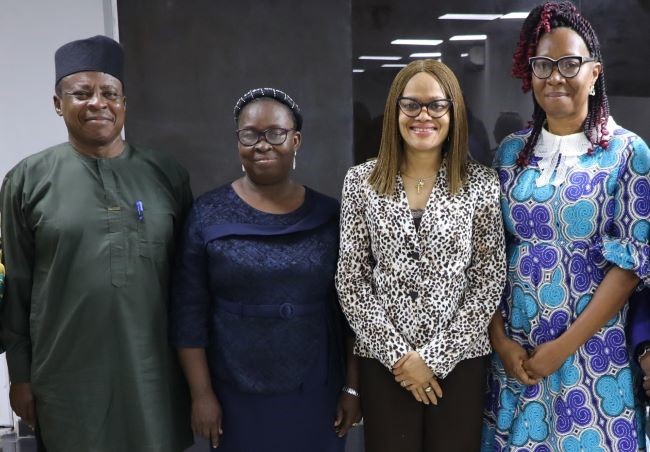Prof. Mojisola Adeyeye, the Director General of National Agency for Food and Drug Administration and Control NAFDAC, has said that Codex food labelling standards offer a range of benefits that enhance food safety and consumer awareness globally by eliminating misleading description of food products and encourage responsible consumption.
She said the standards provide consumers with essential information about ingredients, nutritional content, and allergens, enabling them to make informed choices about the foods they purchase and consume.
Prof Adeyeye made these remarks while hosting the meeting of the National Codex Committee – Technical Committee (NCC-TC) on Food Labelling chaired by NAFDAC and held as a preparatory meeting of Nigeria’s delegates to the 48th session of the Codex Committee on Food Labelling (CCFL48), scheduled to take place in Quebec City, Canada, from October 27 to November 1, 2024.
For businesses, Prof. Adeyeye who was represented by the Director, Food Safety and Applied Nutrition, Mrs. Eva Edwards, noted that compliance with these standards facilitate access to international markets by ensuring that products meet various regulatory requirements.
‘’This not only reduces the risk of legal issues but also enhances the competitiveness of products on a global scale. In addition, these standards can highlight sustainable practices, promoting environmental awareness and encouraging responsible consumption,’’ she said.
The Director General commended the members of the National Codex Committee (NCC) that cut across relevant federal government Ministries, Departments and Agencies, industry, and research institutes for their consistent commitment and dedication to the work of Codex as they gathered to strengthen their collective efforts in food safety and consumer protection.
She urged members of the NCC to share their insights and experiences to foster dialogue, build consensus, and arrive at national positions for the CCFL48 that will advance the cause of food labelling and consumer protection in Nigeria. She encouraged delegates to represent Nigeria with pride and purpose on the global platform of the 48th session of the Codex Committee on Food Labelling.
Speaking in the same vein, the Director General of the Standards Organisation of Nigeria (SON), Dr. Ifeanyi Chukwunonso Okeke admonished the Nigerian delegation to articulate Nigeria’s position at the forthcoming 48th session of the Codex Committee on Food Labelling scheduled to take place in Quebec.
He expressed contentment in his Agency’s commitment towards sustaining the mandate of the National Codex Committee as well as food safety activities in Nigeria.
Dr Okeke who was represented by the Deputy Director, Food Group Unit, Nene Obianwu, emphasized that the Codex Committee on Food Labelling is the Codex Committee that is saddled with the responsibility, including but not limited to, of tracking labeling applicable to food, and endorse specific provisions on labelling prepared by other Codex Committees as well as study problems associated with the advertisement of food with particular reference to claims and misleading descriptions.
He expressed his Agency’s profound gratitude to the Director General NAFDAC for ensuring successful hosting of preparatory meetings of the National Codex Committee which reflects the NAFDAC’s commitment towards promoting and advancing Codex activities in Nigeria.
The Chief Executive Officer of the Nigerian Export Promotion Council (NEPC) Dr (Mrs.) Nonye Ayeni espoused the significance of aligning the national standards with international best practices, stressing that this is crucial for Nigerian non-oil export goods as it enables our products to compete favourably in the global market.
Dr Ayeni who was represented by the Regional Coordinator, South West, of NEPC, Mr. Ganiyu Ahmed Gbolagade, emphasized that her Agency’s vision was to make the world a market place for Nigerian non-oil products. To achieve this, she said NEPC was committed to diversifying Nigeria’s product base, promoting export readiness and enhancing trade facilitation.
In this context of food safety, she said ‘’we recognize the need for science-based standards to ensure that our national standards align with international Codex standards, and strengthen the regulatory framework to guarantee safe and nutritious food and encourage Nigerian exporters to meet international food safety requirements.
‘’We appreciate the National Codex Committee’s efforts to develop and harmonize standards. NEPC is committed to supporting this initiative and ensure that Nigeria’s non-oil export products meet global standards.’’
The Codex Alimentarius, or “Food Code”, is a collection of international standards, guidelines and codes of practice to protect the health of consumers and ensure fair practices in the food trade. Codex standards are used worldwide to harmonize national food safety regulations and are recognized in the WTO Agreement on the Application of Sanitary and Phytosanitary (SPS) Measures as the international reference point for food safety. When food producers and traders comply with Codex standards, consumers can trust the safety and quality of the products they buy and importers can have confidence that the food they ordered will meet the specifications.
The Codex Alimentarius Commission, also known as CAC, was established in 1963 by the Food and Agriculture Organization of the United Nations (FAO) and the World Health Organization (WHO) to protect consumer health and promote fair practices in the food trade. The legitimacy and universality of Codex standards depend on the effective participation of all Codex membership.






